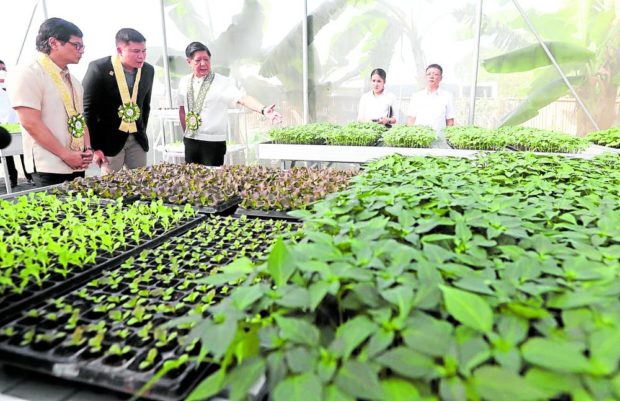Marcos vows decent living for Filipino farmers ‘so they’ll live by virtue of hard work’

URBAN GARDEN President Marcos inspects seedling beds prepared for the Chief Executive’s urban gardening project. INQUIRER file photo / MARIANNE BERMUDEZ
MANILA, Philippines — President Ferdinand “Bongbong” Marcos Jr. on Monday said discussions on improving the country’s agriculture sector should not only focus on productivity but also to the benefits that farmers should receive.
Marcos said discussions should be “about a decent living for farmers” so that they “can live by virtue of their hard work.”
“Sometimes what gets lost in that discussion is what is going to be the profit that goes back to the farmers, and in the end this is really what it’s all about. It is about a decent living for our farmers so that our farmers can live by virtue of their hard work,” he said.
He issued the remark in his speech after the signing of the memorandum of agreement for the Kapatid Angat Lahat for Agriculture Program (KALAP) in Malacañang.
KALAP is a partnership between public and private agencies that seeks to promote “inclusive economic growth.” for micro, small, and medium enterprises (MSME).
Marcos vowed that the government will help farmers so that they can live “beyond just surviving.”
“That they can, besides just surviving, that they can hold out hope within themselves, that soon, one day, we can do more. We will buy more property, we will build a business. There is hope, and there is a chance for them to better themselves in their life, for their families, for their communities. That is what we are trying to do,” he said.
In a chance interview, the President also shared a light moment he had with a 98-yer-old coconut farmer in Malacañang during the signing ceremony.
According to him, Maman Buanoy Layom, who is from Palawan province, had also the chance to meet his father and namesake, the late President Marcos Sr.
“Tinatanong ko kung ano ‘yung kinakain niya kasi I want to live that long also and be that strong when I’m his age. What he was telling me was that nakilala raw niya ‘yung father ko. And he was saying that so ngayon dalawa na ‘yung nakilala kong Pangulong Marcos,” Marcos said.
(I asked him what he eats because I want to live that long also and be strong when I’m his age. He told me that he also met with my father. He told me that he already met two President Marcoses.)
“Tapos sabi ko – I asked him where was he, how did he meet my father kasi mukhang outstanding farmer na siya noon pa kaya medyo lumabas na. So lumabas na ‘yung pangalan niya. Pero ngayon naging oldest farmer pa siya,” the President added.
(Then I asked him how did he meet my father because he seems like an outstanding farmer since then. So, I learned about his name.)
Layom is a beneficiary of Lionheart Farms, one of the firms in the Philippines helping small farmers.
“He’s a very, very interesting man. He has stories he could tell. But in a little time we had I think we enjoyed ourselves,” Marcos said.
In his speech, the President said it his hope “that we will be able to say [to] our millennial farmers… [that they] are using the best technologies with the complete support of a value chain that supports them and that supports their needs.”
“One day we will do this but we need all of you and we need everyone in our society to pull together to be able to do this,” the President said.
The chief executive also called on small and medium business owners, farmers and fisherfolk to continue improving their operations and businesses and aspire for expansion with the signing of the MOA on the KALAP program.
Kalap program
Marcos also called on small and medium business owners, farmers and fisherfolk to continue improving their operations and businesses and aspire for expansion with the signing of the MOA on the KALAP program.
He said the Kalap program, which stands for “Kapatid Angat Lahat for Agriculture Program” will enable farmers and the country’s micro, small, and medium enterprises (MSMEs) to become “more productive, profitable, sustainable and globally competitive.”
“We know very well how MSMEs are crucial in the creation of new ideas, of jobs and wealth in the country, so it is only right that we recognize the power and the influence that this sector holds,” he said.
“We also recognize the role of big corporations in [innovating] MSMEs, spurring their growth, and realizing their potential. Hence, I am very happy to note the objective of the KALAP to integrate small farmers and agri-entrepreneurs into the value chain of large companies,” Marcos added.
Highlighting the benefits of the whole-of-society approach, Marcos said his government, the private businesses, and the greater public must give their endless support to the program and to one another.
“I have always said that in the difficulties that we are facing ahead, there is no sector of society that can manage the recovery by itself,” he said.
“And it cannot be done unless the different sectors of society are working together, working together and trying to implement a plan with a common understanding of what is needed to be done, with a common understanding of what people need, without forgetting every part of that sector or that area of the economy,” the President added.
Marcos said he also wants involved government agencies to collaborate closely with the Philippine Center of Entrepreneurship-Go Negosyo and other partners in the private sector as he urged them to remain true to their calling as civil servants—embracing patriotism, integrity, and excellence for the success of the KALAP program.
The President also expressed hope that the government’s private partners and businesses will never tire in working with his administration.